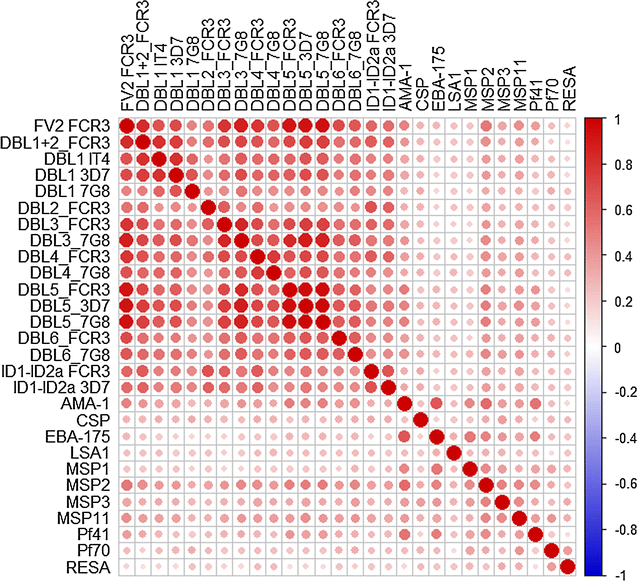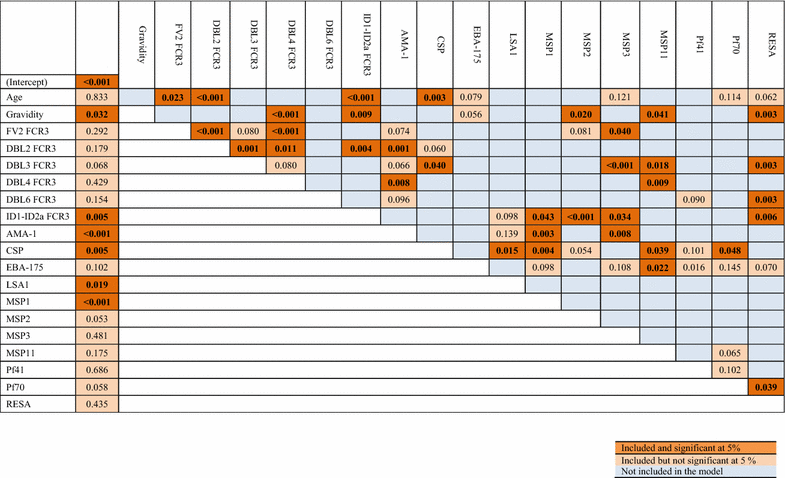Statistical prediction of immunity to placental malaria based on multi-assay antibody data for malarial antigens
- PMID: 28962616
- PMCID: PMC5622501
- DOI: 10.1186/s12936-017-2041-3
Statistical prediction of immunity to placental malaria based on multi-assay antibody data for malarial antigens
Abstract
Background: Plasmodium falciparum infections are especially severe in pregnant women because infected erythrocytes (IE) express VAR2CSA, a ligand that binds to placental trophoblasts, causing IE to accumulate in the placenta. Resulting inflammation and pathology increases a woman's risk of anemia, miscarriage, premature deliveries, and having low birthweight (LBW) babies. Antibodies (Ab) to VAR2CSA reduce placental parasitaemia and improve pregnancy outcomes. Currently, no single assay is able to predict if a woman has adequate immunity to prevent placental malaria (PM). This study measured Ab levels to 28 malarial antigens and used the data to develop statistical models for predicting if a woman has sufficient immunity to prevent PM.
Methods: Archival plasma samples from 1377 women were screened in a bead-based multiplex assay for Ab to 17 VAR2CSA-associated antigens (full length VAR2CSA (FV2), DBL 1-6 of the FCR3, 3D7 and 7G8 lines, ID1-ID2a (FCR3 and 3D7) and 11 antigens that have been reported to be associated with immunity to P. falciparum (AMA-1, CSP, EBA-175, LSA1, MSP1, MSP2, MSP3, MSP11, Pf41, Pf70 and RESA)). Ab levels along with clinical variables (age, gravidity) were used in the following seven statistical approaches: logistic regression full model, logistic regression reduced model, recursive partitioning, random forests, linear discriminant analysis, quadratic discriminant analysis, and support vector machine.
Results: The best and simplest model proved to be the logistic regression reduced model. AMA-1, MSP2, EBA-175, Pf41, and MSP11 were found to be the top five most important predictors for the PM status based on overall prediction performance.
Conclusions: Not surprising, significant differences were observed between PM positive (PM+) and PM negative (PM-) groups for Ab levels to the majority of malaria antigens. Individually though, these malarial antigens did not achieve reasonably high performances in terms of predicting the PM status. Utilizing multiple antigens in predictive models considerably improved discrimination power compared to individual assays. Among seven different classifiers considered, the reduced logistic regression model produces the best overall predictive performance.
Keywords: Multiplex assays; Placental malaria; Predictive models; VAR2CSA.
Figures


Similar articles
-
Pregnancy-specific malarial immunity and risk of malaria in pregnancy and adverse birth outcomes: a systematic review.BMC Med. 2020 Jan 16;18(1):14. doi: 10.1186/s12916-019-1467-6. BMC Med. 2020. PMID: 31941488 Free PMC article.
-
Association of Antibodies to VAR2CSA and Merozoite Antigens with Pregnancy Outcomes in Women Living in Yaoundé, Cameroon.Infect Immun. 2018 Aug 22;86(9):e00166-18. doi: 10.1128/IAI.00166-18. Print 2018 Sep. Infect Immun. 2018. PMID: 29986889 Free PMC article.
-
The Development, Fine Specificity, and Importance of High-Avidity Antibodies to VAR2CSA in Pregnant Cameroonian Women Living in Yaoundé, an Urban City.Front Immunol. 2021 Feb 26;12:610108. doi: 10.3389/fimmu.2021.610108. eCollection 2021. Front Immunol. 2021. PMID: 33717094 Free PMC article.
-
The antibody response of pregnant Cameroonian women to VAR2CSA ID1-ID2a, a small recombinant protein containing the CSA-binding site.PLoS One. 2014 Feb 4;9(2):e88173. doi: 10.1371/journal.pone.0088173. eCollection 2014. PLoS One. 2014. PMID: 24505415 Free PMC article.
-
VAR2CSA-Mediated Host Defense Evasion of Plasmodium falciparum Infected Erythrocytes in Placental Malaria.Front Immunol. 2021 Feb 9;11:624126. doi: 10.3389/fimmu.2020.624126. eCollection 2020. Front Immunol. 2021. PMID: 33633743 Free PMC article. Review.
Cited by
-
Pregnancy-specific malarial immunity and risk of malaria in pregnancy and adverse birth outcomes: a systematic review.BMC Med. 2020 Jan 16;18(1):14. doi: 10.1186/s12916-019-1467-6. BMC Med. 2020. PMID: 31941488 Free PMC article.
-
Association of Antibodies to VAR2CSA and Merozoite Antigens with Pregnancy Outcomes in Women Living in Yaoundé, Cameroon.Infect Immun. 2018 Aug 22;86(9):e00166-18. doi: 10.1128/IAI.00166-18. Print 2018 Sep. Infect Immun. 2018. PMID: 29986889 Free PMC article.
-
The Development, Fine Specificity, and Importance of High-Avidity Antibodies to VAR2CSA in Pregnant Cameroonian Women Living in Yaoundé, an Urban City.Front Immunol. 2021 Feb 26;12:610108. doi: 10.3389/fimmu.2021.610108. eCollection 2021. Front Immunol. 2021. PMID: 33717094 Free PMC article.
References
-
- Feng G, Aitken E, Yosaatmadja F, Kalilani L, Meshnick SR, Jaworowski A, et al. Antibodies to variant surface antigens of Plasmodium falciparum-infected erythrocytes are associated with protection from treatment failure and the development of anemia in pregnancy. J Infect Dis. 2009;200:299–306. doi: 10.1086/599841. - DOI - PMC - PubMed
-
- O’Neil-Dunne I, Achur RN, Agbor-Enoh ST, Valiyaveettil M, Naik RS, Ockenhouse CF, et al. Gravidity-dependent production of antibodies that inhibit binding of Plasmodium falciparum-infected erythrocytes to placental chondroitin sulfate proteoglycan during pregnancy. Infect Immun. 2001;69:7487–7492. doi: 10.1128/IAI.69.12.7487-7492.2001. - DOI - PMC - PubMed
-
- Staalsoe T, Megnekou R, Fievet N, Ricke CH, Zornig HD, Leke R, et al. Acquisition and decay of antibodies to pregnancy-associated variant antigens on the surface of Plasmodium falciparum-infected erythrocytes that protect against placental parasitemia. J Infect Dis. 2001;184:618–626. doi: 10.1086/322809. - DOI - PubMed
-
- Taylor DW, Zhou A, Marsillio LE, Thuita LW, Leke EB, Branch O, et al. Antibodies that inhibit binding of Plasmodium falciparum-infected erythrocytes to chondroitin sulfate A and to the C terminus of merozoite surface protein 1 correlate with reduced placental malaria in Cameroonian women. Infect Immun. 2004;72:1603–1607. doi: 10.1128/IAI.72.3.1603-1607.2004. - DOI - PMC - PubMed
Publication types
MeSH terms
Substances
Grants and funding
LinkOut - more resources
Full Text Sources
Other Literature Sources

